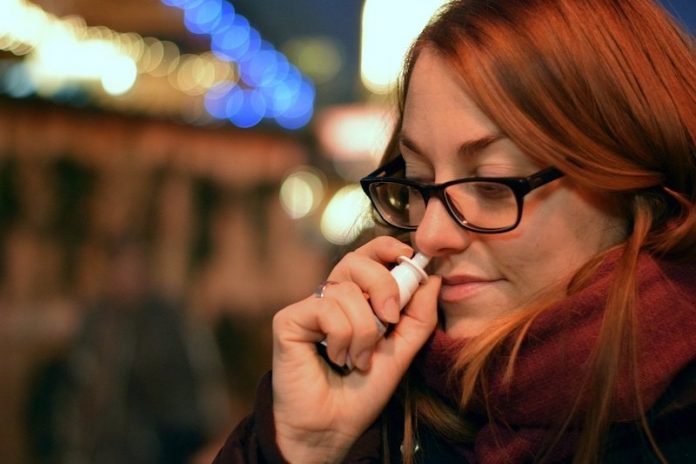
Scientists from Northwestern University and elsewhere found that a new protein-based antiviral nasal spray is better than current antibody treatments.
The drug is being advanced toward Phase I human clinical trials to treat COVID-19.
The research is published in Science Translational Medicine and was conducted by Michael Jewett et al.
The new protein therapies thwarted infection by interfering with the virus’s ability to enter cells.
The top protein neutralized the virus with similar or greater potency than antibody treatments with Emergency Use Authorization status from the U.S. Food and Drug Administration (FDA).
Notably, the top protein also neutralized all tested SARS-CoV-2 variants, something that many clinical antibodies have failed to do.
In the study, the team administered the treatment to mice as a nasal spray, they found that the best of these antiviral proteins reduced symptoms of infection—or even prevented infection outright.
As the SARS-CoV-2 virus has mutated to create new variants, some treatments have become less effective in fighting the ever-evolving virus.
Just last month, the FDA paused several monoclonal antibody treatments, for example, due to their failure against the BA.2 omicron subvariant.
Unlike these antibody treatments, which failed to neutralize omicron, the new drug maintained potency against the omicron variant of concern.
By blocking the virus’ spike protein, the new antiviral drug prevents it from binding to the human angiotensin-converting enzyme 2 (ACE2) receptor, which is the entry point for infecting the body.
Because the novel coronavirus and its mutant variants cannot infect the body without binding to the ACE2 receptor, the antiviral also should work against future variants.
In addition to losing effectiveness, current antibody therapies also come with several problems: They are difficult to develop, expensive, and require a healthcare professional to administer.
They also require complicated supply chains and extreme refrigeration, which is often unavailable in low-resource settings.
The new antiviral drug solves all these problems.
As opposed to monoclonal antibodies, which are made by cloning and culturing living mammalian cells, the new antiviral treatment is produced large-scale in microorganisms like E. coli, making them more cost-effective to manufacture.
Not only is the new therapy stable in high heat, which could further streamline manufacturing and decrease the cost of goods for clinical development, it also holds promise for being self-administered as a one-time nasal spray, bypassing the need for medical professionals.
The researchers imagine that it could be available at the pharmacy and used as a preventative measure to treat infections.
Sign up for our newsletter for more information about this topic.
If you care about COVID, please read studies about new treatment option for COVID-19, and E-cigarettes with this flavor can harm your lungs most.
For more information about COVID, please see recent studies about a universal antibody therapy for all COVID-19 variants, and results showing this new oral drug may prevent death from COVID-19.
Copyright © 2022 Knowridge Science Report. All rights reserved.



